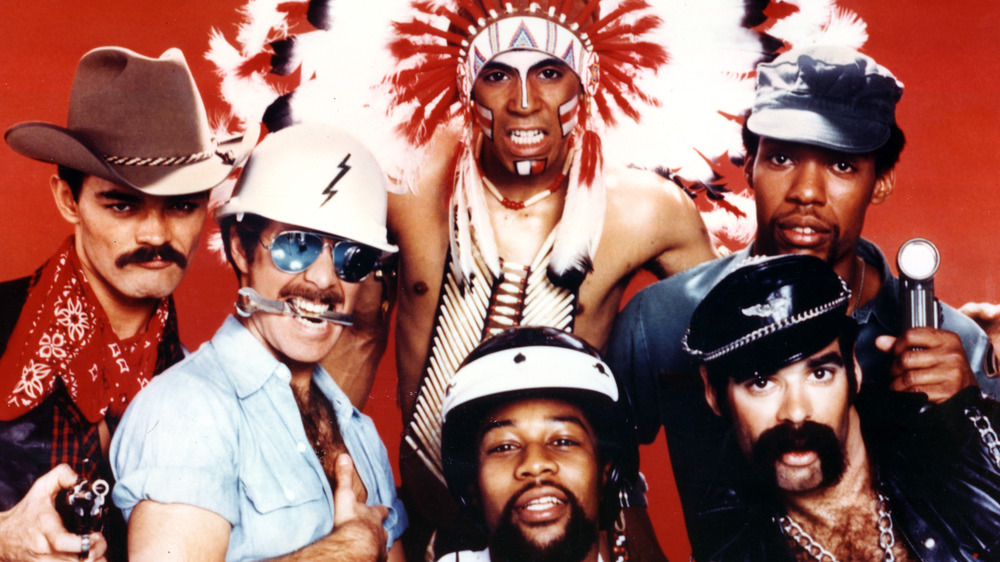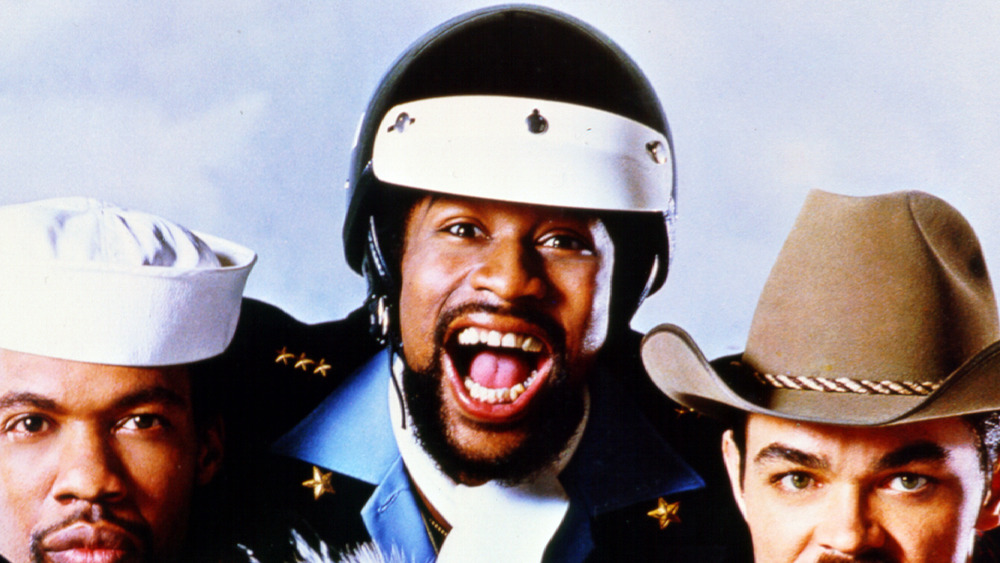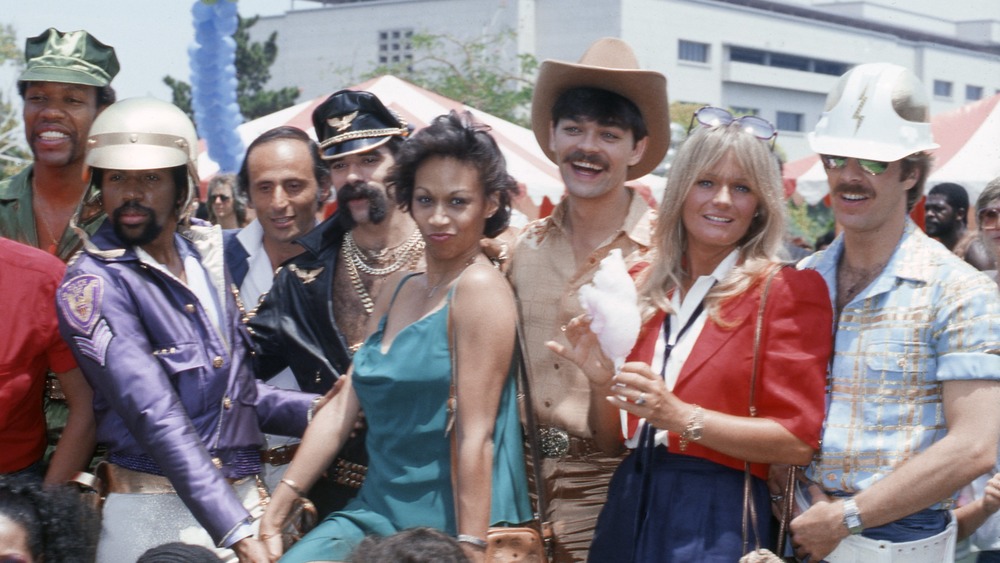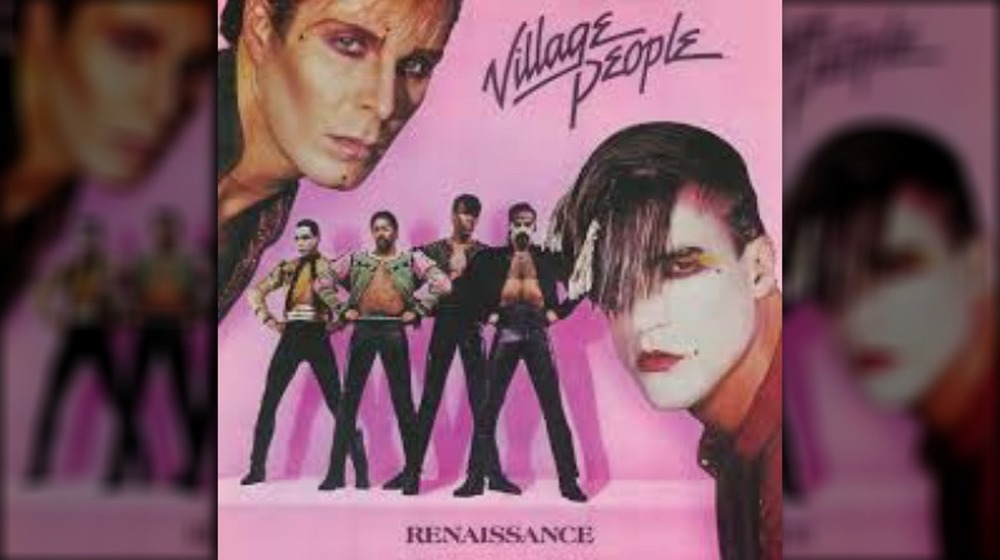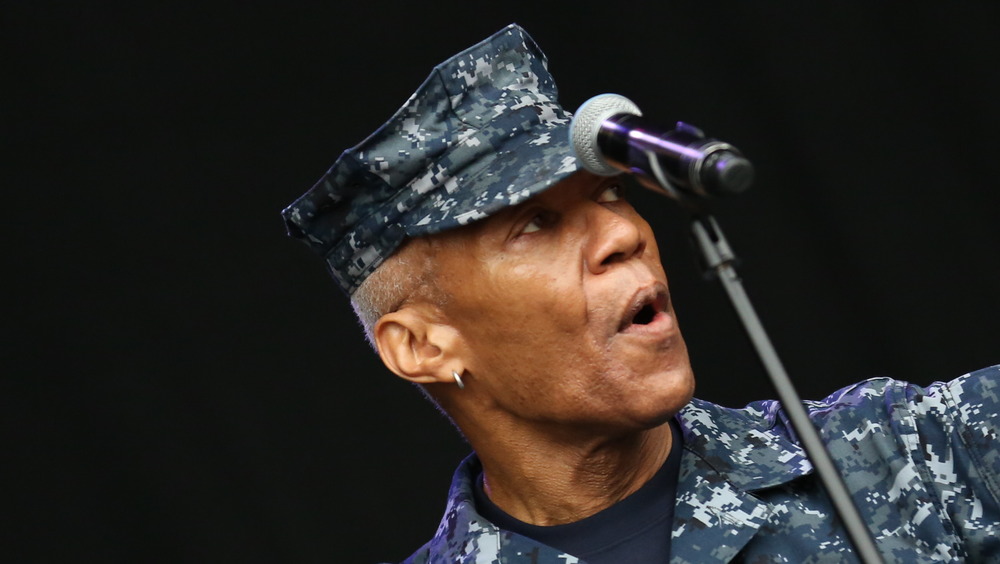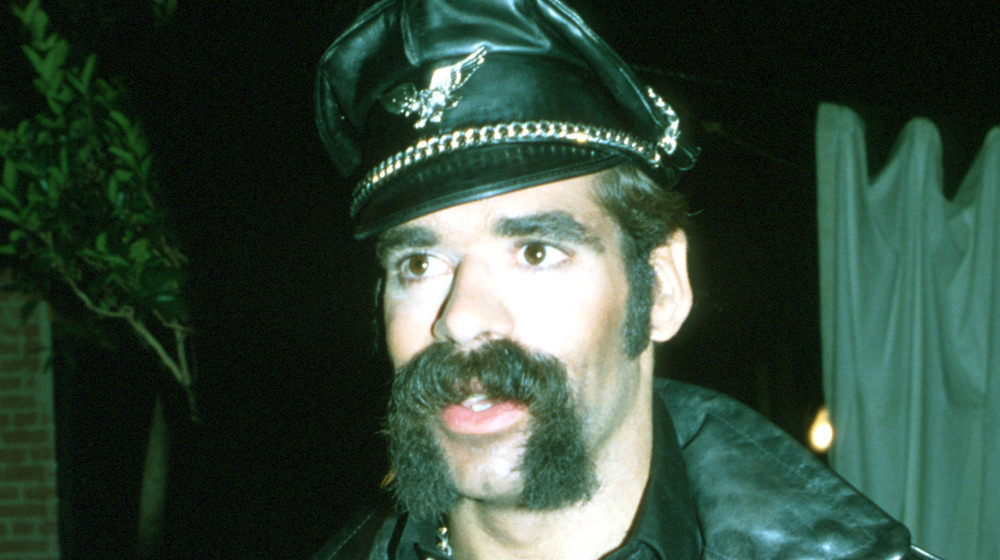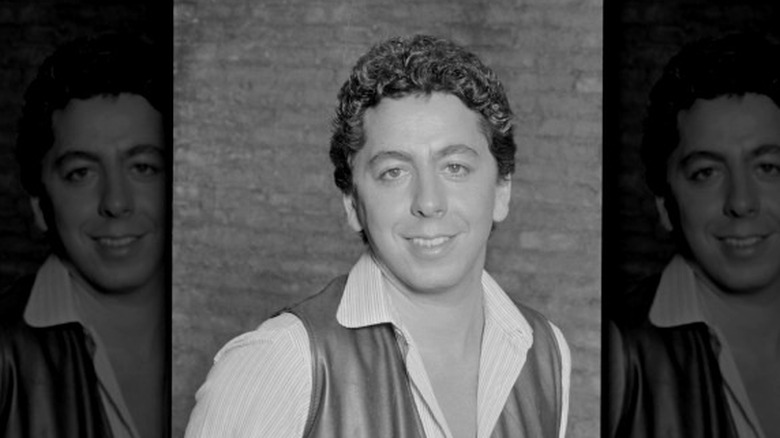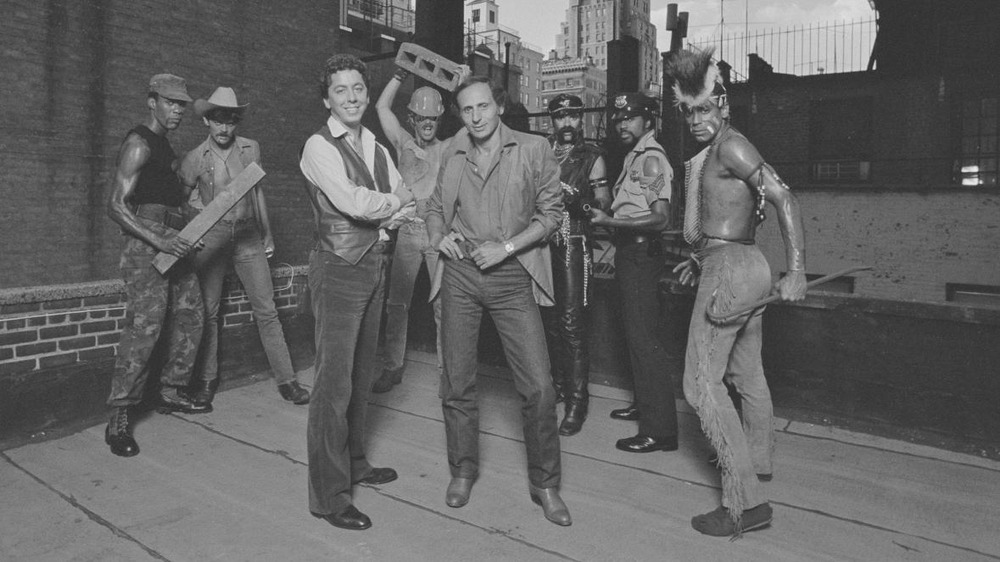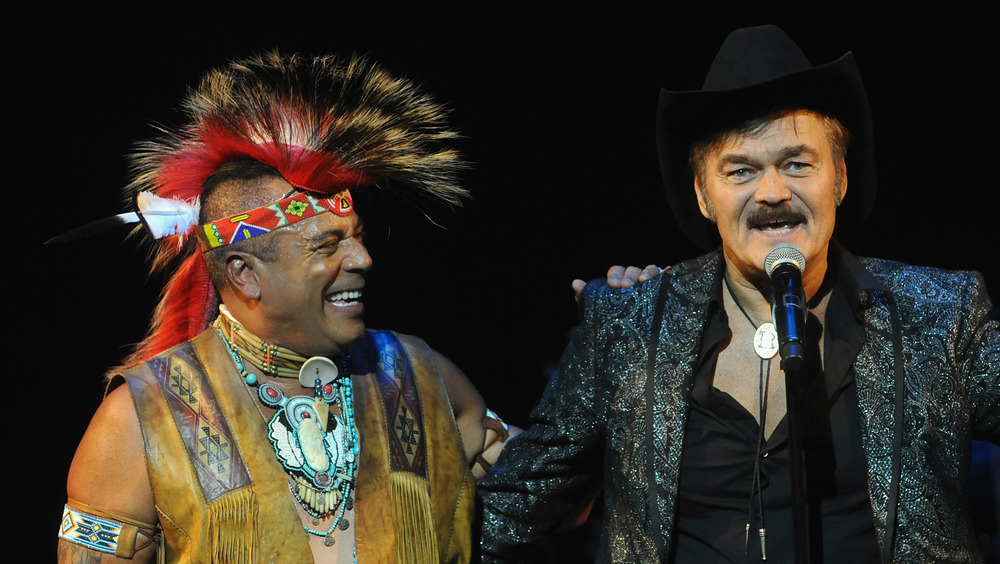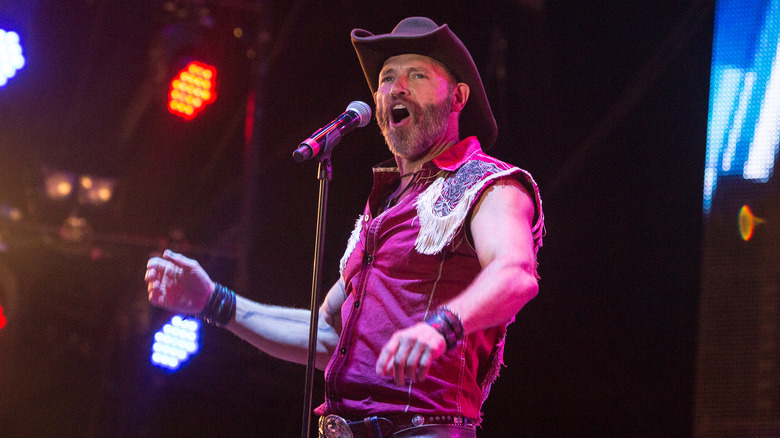The Tragic Real-Life Story Of The Village People
We may receive a commission on purchases made from links.
Of all the disco groups that exploded onto the pop culture radar in the late 1970s, there was none more fun and more recognizable than the Village People. Only truly popular for less than two years, the Village People made their time at the top count, churning out a string of catchy, witty, danceable hits, imploring the world to enlist "In the Navy," be a "Macho Man," and stay at the "YMCA" Even 40 years later, any or all of those songs are almost guaranteed to be played at any big party or wedding reception.
Beyond their hooky songs, the Village People came with an irresistible hook — its members were known by their personalities and backgrounds as expressed through their clothes, many of which were archetypes of American manliness. Among its ranks were a cowboy, a construction worker, a leather-clad biker, a Native American warrior, a police officer, and a soldier.
The Village People made some of the happiest music on record. But out of the costumes and off the stage, the members of the iconic disco vocal group suffered greatly, becoming some of the many tragic stories about disco's biggest stars. Here's a look into the tragic life stories of the people behind the Village People.
Original member Victor Willis has sued the group more than once
Victor Willis wasn't only the lead singer of the Village People during its 1970s hit parade, he was also one of its songwriters. Along with group's architects Jacques Morali and Henri Belolo, Willis wrote more than a dozen Village People songs, including "In the Navy," "Go West," and "YMCA" As such, he owned one-third of the copyrights (and its ensuing royalties) on those songs for years. That might not have been exactly true, however — in 2011 Willis sued to get 50 percent credit, alleging that the copyright deals he'd signed back in the 1970s were legally suspect or invalid. Willis emerged as the victor in that suit in 2015, striking Belolo's name from the credits of 13 of the Village People's most well-known and profitable songs, and increasing Willis' cut of the proceeds. But Willis actually sued the Village People more than once.
In 2017, Willis won another lawsuit with his former group — the courts granted the singer the rights to the name of the band that he'd left decades earlier. "I got back something that belonged to me," Willis told the Chicago Tribune. At that time, a version of the group was still occasionally playing gigs around the world, but when Willis took charge, he put a stop to that. He fired every person then singing in the Village People, including original group member Felipe Rose and Ray Simpson, who took over for Willis as the policeman after his departure.
The Village People's movie was a catastrophic failure
The Village People had something that few other disco acts did: a visual element, with its members' stage outfits. It was almost a foregone conclusion that somebody would make a Village People movie. That film, " Can't Stop the Music ," was a loose retelling of the Village People's formation. Future star Steve Guttenberg plays songwriter Jack Morell, an Americanized version of Village People crafter Jacques Morali, who frantically races around New York on roller skates, hoping to be discovered until he forms a group instead.
"Can't Stop the Music" couldn't lure an audience, and it earned just $2 million at the box office. That might have been because it was released in 1980, when disco and the Village People were increasingly passé. It might also have something to do with how the movie was a universally acknowledged disaster . Producers hired Nancy Walker to direct, who was best known for playing Ida Morgenstern on the sitcoms "The Mary Tyler Moore Show" and "Rhoda," and who had never directed a theatrical film before.
How bad was "Can't Stop the Music"? It inspired John Wilson to create the Razzie Awards, handed out annually to the worst in film. At the inaugural ceremony, the failed Village People movie won in two of the seven categories for which it was nominated: Worst Screenplay and Worst Picture of the Year.
The Village People couldn't survive the post-disco era
With disco dead by the early 1980s, and the Village People's status as pop stars greatly endangered by the abysmal failure of their movie "Can't Stop the Music," the group whose last charting song was the minor 1979 hit "Ready for the ' 80s" had to prove that it could adapt to changing times and tastes. In 1981, the Village People released their seventh album, "Renaissance." By that point, New Wave — rock n' roll stripped down to its core, punchier elements, and sometimes with the addition of keyboards — had replaced disco as the hottest thing in music, and the Village People gave it a try on songs like " Do You Wanna Spend the Night" and "Food Fight ."
The band also reinvented themselves visually , dropping their signature stage costumes for a sleeker, very '80s look of tight pants, vests, and heavy makeup. The noble attempt to evolve was thoroughly rejected by the public — "Renaissance" yielded no hit singles and stalled at #138 on the Billboard album chart, rendering the Village People relics of the '70s.
Alex Briley's brother died in the 9/11 attacks
The Village People are part of New York City history, formed by denizens of the Big Apple's thriving, underground gay club scene of the 1970s. Among its many archetypal masculine characters was a GI dressed in camouflage fatigues, embodied by singer Alex Briley , who sometimes wore a naval uniform after the success of the single "In the Navy." Beyond the Village People, Briley is tragically and ultimately connected to another moment in New York history, one of the many stories born out of the darkest days on record.
The attacks of September 11, 2001, in which terrorists hijacked planes in American airspace and directed two of them into the World Trade Center in Manhattan, resulted in numerous shocking, hard-to-fathom images, including one picture captured by photographer Richard Drew of a man tragically falling to his death from one of the besieged Twin Towers, mid-descent. The photo, known as "Falling Man," was published by many news outlets and became a part of the cultural fabric as the world processed the events of 9/11. The identity of the subject was difficult to ascertain, although it has been speculated that it was Jonathan Briley, an employee of the restaurant at the top of the north tower , Windows on the World, who was found dead after falling from the stricken building. His brother was Alex Briley of the Village People.
Glenn Hughes dies of lung cancer
If you're wondering how many of the original members of the Village People are still alive, the answer — at least as of early 2025 — is all but one. The surviving members are Victor Willis, who is still very much front and center; Felipe Rose and Alex Briley, who stepped down in 2017; and Randy Jones and David Hodo, both of whom spent some time in Broadway before leaving in 1990 and 2017, respectively. Sadly, the one no longer with us is Glenn Hughes, aka "the biker" or "leatherman."
Hughes rocked a leather outfit that covered his entire body (except for his bare chest), topped with a jaunty hat and accessorized with one of the most impressive '70s mustaches this side of Burt Reynolds. Hughes' look was one of the group's many nods to New York's gay community, which flew right over the heads of millions of fans in the '70s, when homosexuality was not widely acknowledged, discussed, or accepted. Village People mastermind Jacques Morali based the character on patrons of a New York leather bar and sex club called the Mineshaft , which Hughes frequented.
Hughes remained with the Village People long past his disco heyday, performing as the biker in smaller venues and on the nostalgia circuit until 1996, when he struck out on his own and became a regular on New York's cabaret scene. That reinvention and second act unfortunately didn't last long for Hughes. In March 2001, Hughes passed away at his home in Manhattan from lung cancer. He was 50 years old.
One of the group's creative forces died of AIDS
Jacques Morali wasn't technically a member of the Village People, but he's probably the most important person in the group's storied history. The French-Moroccan songwriter and producer moved to the United States in the early 1970s to make it into the music business, and shortly after he scored a hit with "Brazil" by The Ritchie Family, a group he helped assemble.
He saw Felipe Rose dancing in traditional Native American clothing at a New York club and decided to form a group around him, placing newspaper ads seeking "gay singers and dancers, very good-looking and with mustaches" (via The New York Times ). As this was the relatively more conservative 1970s, homosexuality wasn't much discussed or acknowledged. Morali built a group out of New York's gay community and club scene and wrote and produced songs laced with gay issues, which millions of naive listeners at the time didn't even notice.
According to Morali's creative partner, Henri Belolo, this was a form of advocacy. "We were keen to do something for [LGBT culture] because Jacques was gay, and I was feeling that an injustice was done to the gay community," he told Red Bull Music Academy . In the late 1970s and 1980s, that community was also a flashpoint in the early messed-up history of the HIV/AIDS crisis , and sadly, Morali died from the disease in 1991 at age 44.
The Village People's producer died suddenly
Jacques Morali is widely credited as the man who created the Village People, putting out an ad in the 1970s looking for singers that he could then assemble into a vocal group that would perform his compositions. Henri Belolo, Morali's creative partner, helped form the Village People, constructing its multi-character vibe and also nailing down its celebratory disco-pop sound.
Morali and Belolo, both Moroccan natives, met in the US in 1973 and soon after started working together, co-producing "Brazil," the 1975 disco smash by The Ritchie Family. That song helped establish many disco tropes, particularly the strings-and-horns-heavy sound, and also served as a warm-up for the Village People, as The Ritchie Family was similarly a group put together by Morali and Belolo. The latter went on to co-create many of the Village People's best-known songs and biggest hits, including "YMCA," "In the Navy," and "Macho Man." After the disco craze subsided, Belolo continued to work as a dance music producer until his unexpected death in August 2019 at age 82 .
There's been some in-fighting amongst the Village People
Playboy Ivan Wilzig gained a reputation for throwing a big bash each summer at his 15,000-square-foot castle, located in the exclusive Hamptons area of New York, and in 2015, the party was set to be a Studio 54-themed affair. Guests invited to the disco-oriented gala were told to dress like any one of the Village People, who'd be represented by Randy Jones — Wilzig had invited the group's cowboy to perform at the shindig. But then he also invited Felipe Rose, the Village People's Native American member. Rose didn't want to share the spotlight with Jones, according to a source close to the situation, and told Wilzig that he'd have to choose between him and the cowboy. Wilzig chose the cowboy.
That could've been the end of it, but Jones dismissed Rose's actions with some remarks that cruelly alluded to his former colleague's heritage. "If through any miscommunication Felipe's feathers have been ruffled from one of his gorgeous headdresses, I'm sure we could find a time and place to have a powwow and pass around the peace pipe," he said (via Page Six ).
Lead singer Victor Willis experienced issues with substance misuse
Not only has Victor Willis experienced issues with some of the other members of the Village People, he's also had to overcome some personal challenges. As is often the case in the music business, Willis' issues involved substance misuse. It came to a head in March 2006, when he was pulled over for a routine traffic stop and was arrested after a search of the vehicle turned up drug paraphernalia and some cocaine.
Making matters worse was that there was already an arrest warrant out for Willis, who had skipped sentence for a 2005 conviction of possession of a few grams of cocaine and a loaded pistol, also after a traffic stop. "It's just sad that his life has spiraled down to the point where in all likelihood he's going to go to prison," prosecutor Morley Pitt told Reuters . "You never like to see anybody go to prison, let alone somebody who is 54 years old."
When he was sentenced in September 2006, Willis managed to avoid jail time when the judge sentenced him to three years of probation, in addition to 30 days of rehab at the Betty Ford Center in California, followed by an additional six months of treatment at another clinic. "I think he sees Victor's enormous potential and senses that this time he has at least what appears to be a genuine commitment to maintaining his sobriety," the singer's lawyer, Mark Geragos, said after the sentencing (via SFGate ).
If you or anyone you know needs help with addiction issues, help is available. Visit the Substance Abuse and Mental Health Services Administration website or contact SAMHSA's National Helpline at 1-800-662-HELP (4357).
Jim Newman isn't happy about the Trump inauguration
After winning his long-fought copyright battle in 2017, lead singer Victor Willis took control of the Village People, both the band and the brand. Meanwhile, Donald Trump regularly played "YMCA" to conclude his campaign rallies. Willis took to Facebook in December 2024 to reveal that even though he'd received thousands of complaints from ticked-off fans, Trump's usage of the song had actually led to a resurgence on the charts, with the song hitting No. 1 on the Billboard charts 45 years after its release. Willis was keen to explain the real reason why the Village People changed their tune about Donald Trump .
"The financial benefits have been great as well as 'YMCA' is estimated to gross several million dollars since the President Elect's continued use of the song," Willis wrote, while also insisting that a song that had been considered a gay anthem for decades was nothing of the sort. "It is not," he stated, insisting there was nothing gay about "YMCA"
When the Willis-led Village People performed the song at Trump's inauguration, they were branded traitors by fans. Among the critics to blast the group for performing at the inauguration was Jim Newman (pictured above), a former member of the Village People. "Our Village People would never, ever perform at Trump rally," Newman declared in a video he shared via Instagram . "We would never give him the right to use those songs, and we would never slap the face of the strong, especially gay audience, that made us who we are today."
